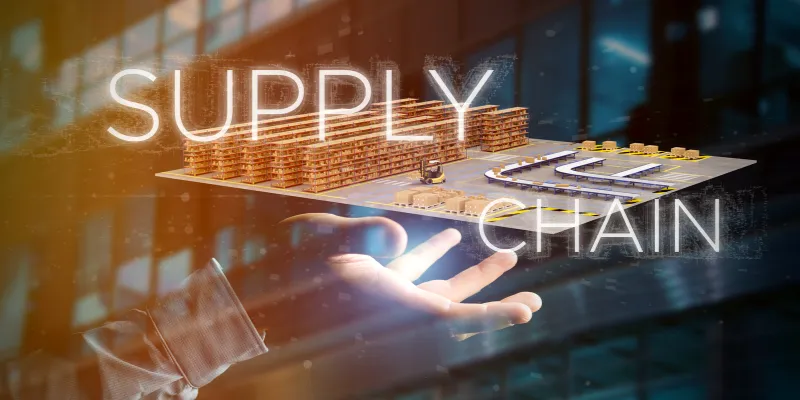How this SCaaS company aims to build a bridge between MSMEs and corporates
Supply-chain-as-a-service (SCaaS) involves outsourcing several supply chain management functions to a third party which offers a flexible model to SMEs. Here’s how Aksum Trademart aims to help SMEs in simplifying their supply chain.
While the COVID-19 pandemic may have ebbed away, its impact can still be felt large and wide. MSMEs are still caught in the wake of its turbulence—with disruptions in both the demand and supply sides creating a lasting impact.
The pandemic created a lot of challenges for MSMEs and according to Ministry of MSME data, nearly 6,000 units were shut in FY21 and FY22. A core factor contributing to this downslide was the supply chain logjam, which had not been addressed at large.
In 2021, Sumit Bhatia and Ankit Jain started Aksum Trademart Pvt Ltd to help small and medium businesses (SMEs) and corporates build sufficient flexibility in their supply chain processes. The company develops a framework that helps SMEs plan and execute their procurement operations and working capital management efficiently. The concept is called supply-chain-as-a-service (SCaaS).
SCaaS refers to the outsourcing of several or all supply chain management functions to a third party which offers a flexible model for SMEs to operate their supply chains without upfront heavy investment in people, processes, and technology.
“There are many B2B players in the market, however, the biggest problem lies in connecting the small businesses with potential large buyers and even if that is done, the hindrance of smooth logistics, quality check, working capital, and a lot more pose various problems,” says co-founder Ankit in a conversation with SMBStory.
In an interview, Ankit and Sumit talks about the idea behind the company, what makes it stand out, and the challenges faced.
Edited excerpts:
SMBStory [SMBS]: What was the idea behind starting Aksum and how is the company helping SMEs?
Ankit Jain [AJ]: Sumit and I were on opposite sides of the table in our previous roles. Both of us complement each other in our core competencies—like me coming from a background of credit, corporate finance and technology, and Sumit having deep domain knowledge of sourcing and supply chain. This added an extra level of comfort between us as we can address a wide spectrum of problems with our respective competencies.
We realised that there are so many inefficiencies that still exist in the supply chain, and are yet to be addressed by the existing B2B players. We decided to work on a model that can solve this core problem being faced by almost every corporation, irrespective of its size. However, we observed that such problems faced by SME/MSMEs were greater in magnitude, and thus we decided to concentrate in that area.
Further, B2B still is highly unorganised—having negligible transparency and inefficient processes. We want to become the market disruptor by organising this segment with standard operating procedures and making the value chain efficient.
In order to leverage all available technologies in the future, small companies will not have the expertise, resources, and funding to try to building SCaaS on their own. Even the largest companies want to leverage the efficiencies of ScaaS by outsourcing some aspects of their supply chain.
SCaaS is in its nascent stages and is gaining importance in the Indian business ecosystem. There is very little data available in the public domain, but since the B2B industry in India is larger than $500 billion, the opportunities are immense to disrupt this area.
SMBS: Companies like Zetwerk are also operating in the same domain. How does Aksum stand out from its competitors?
Sumit Bhatia [SB]: Within the B2B space, we have differentiated ourselves from the beginning by focusing on the supply chain issues faced by the SME sector.
In today’s digital age, companies are going to become more reliant on other expert organisations to perform some or all of their supply chain tasks. Our clients can outsource their manufacturing, distribution, procurement, logistics, accounts payable systems, and more to us.
The digital supply chain of the future will require companies to outsource, that is, to leverage SCaaS. The advantages we offer include end-to-end connectivity, improved productivity, lower cost, greater service, heightened flexibility and adaptability, and better asset management.

All of the above is planned to be backed by a strong digital and IT backbone. This will require the standardisation of complex processes like procurement, negotiations, accounting, and revenue management.
At Aksum, we provide many services to SMEs, including:
- Reducing the price disadvantage in comparison to large corporations by passing the advantage of bulk buying to SMEs.
- Assisting them in expanding their markets by making a wider pool of suppliers and customers accessible, thereby creating a higher value discovery for their businesses.
- Reducing the leakages in the supply chain through transparent processes, and ultimately, helping them increase their profitability.
- Unlocking funds intelligently by helping SMEs leverage the available banking and financing tools.
- Scaling their manufacturing and distribution operations by providing them with flexible inventory management options.
- Optimising the working capital investment required by the corporates/MSMEs by providing them with benefits of economies of scale, and removing the bottleneck of ‘Minimum Order Quantity’ for the SMEs.
In a span of seven months, we have been able to foster relationships with companies like L&T, Jindal Stainless, Tata Projects, and Shri Rathi Group, to name a few. We have supplied more than 200 SKUs spread across categories like steel, coal, tiles, paint, polymer, and chemicals to our customers.
We have a network of around 30 MSMEs with whom we are working pan India for projects. Our supplier partnerships also include companies like Berger Paints Ltd, Cera Sanitaryware Ltd, and Kajaria Ceramics Ltd, among others. Recently, we entered into a partnership with a large steel company having a turnover of more than Rs 2,000 crore to procure mild steel for our clients.
SMBS: What are the behavioural changes Aksum has witnessed among large corporates choosing MSMEs as their suppliers, and what are the changes observed among MSMEs?
AJ: The large corporations have realised the importance of the contribution of the MSME ecosystem to India's GDP. India, being an entrepreneur-led country, has so many businesses working in niche areas that small businesses can’t be ignored. Large corporations are trying to develop standards or processes where these enterprises can participate in their bids and tenders, with Aksum also playing a vital role to showcase the same and onboarding MSMEs.
Among these enterprises, there is a paradigm shift from inclusiveness to expansion across boundaries. Now, all businesses want to expand their horizons, target more geographies, and want to adopt technology to aid them in their growth.
Aksum plays a vital role in providing these businesses with a platform where their product can be showcased across geographies, thereby increasing their presence and also bringing them o-board to adopt technology.
SMBS: What are the major challenges the company faces and what are your the expansion plans?
SB: The major challenge faced by us is that the B2B and MSME sector is not just unorganised, but averse to technology adoption as well. But we see this as a big opportunity to turn into disruption. We are succeeding at a decent pace but we definitely need capital to expand faster as well as to develop processes for enabling the B2B business on a technology platform.
We are planning to raise around $25 million in the next 12 months, primarily aimed at building a robust technology framework and expanding our footprint across more geographies and commodities.
Edited by Kanishk Singh









